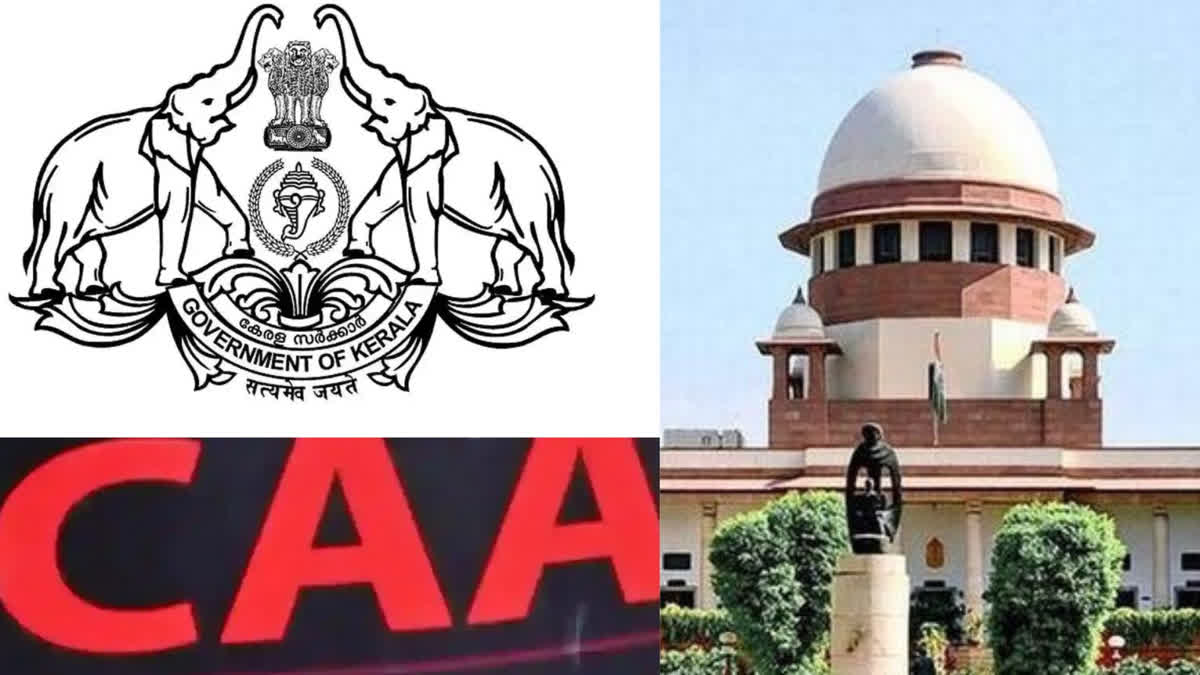New Delhi : The Kerala government has moved the Supreme Court seeking an interim injunction to restrain Centre from implementing the Citizenship Amendment Act, 2019 and its rules, which were notified recently.
In an application, the LDF government submitted that with the coming to force of the CAA Rules, the persons who became entitled for citizenship as per the Act will apply for citizenship and the plaintiff state would be compelled to ensure the compliance of the CAA and the rules and orders, which, it is submitted, are unconstitutional.
The state government’s original suit is pending where it has challenged the validity of 2019 law to provide citizenship to minorities belonging to only six religions from Pakistan, Bangladesh and Afghanistan.
The state government said the classifications based on religion and the country, are discriminatory, arbitrary, unreasonable and contravened the principles of secularism, which has been recognised repeatedly by this court as a basic structure of the Constitution.
It said CAA Rules notified more than four years after the passage of the Act, indicated that Centre was aware that there is no urgency in implementing the provisions.
The state said it is submitted that the Amendment Act is a colourable legislation; in as much as there is a constitutional prohibition to make the said legislation in violation of the secular nature of the Constitution; but despite the same, the legislature has enacted it. “It is submitted that even though the statement of objects and reasons of the Citizenship Amendment Bill referred to persecution of the minorities in the three countries of Pakistan, Afghanistan and Bangladesh, the Impugned Amendment Act does not restrict the class of persons to whom the benefit of the amendment has been extended to persons who are in fact persecuted or claim to have been persecuted”, said the plea.
The plea said that there is no rationale in grouping together for the purposes of the Amendment Act and Rules and Orders the three countries of Pakistan, Afghanistan and Bangladesh. “Such grouping is not founded on any rationale principle justifying a separate special treatment for the irrationally chosen class of religious minorities facing persecution on the basis of religion therein”, it added.
The plea said there is no rationale in not extending the rights conferred to a class of minorities from Pakistan, Afghanistan and Bangladesh to religious minorities belonging to the said countries of Sri Lanka, Myanmar, Nepal and Bhutan. “The arbitrary classification of the aforesaid three countries of Pakistan, Afghanistan and Bangladesh without any rationale or standard principles constitutes manifest arbitrariness and violates Article 14 of the Constitution”, it added.
“While the Hindus from Pakistan, Afghanistan and Bangladesh are covered by the Impugned Amendment Act, the defendant did not consider the issues of the Hindus, primarily of Tamil descent, in Sri Lanka and Hindu Madhesis in Terai of Nepal, whose ancestors migrated to Sri Lanka and Nepal respectively in the eighteenth Century from the then British India”, it added.
The plea said Shias are reportedly subjected to persecution in Pakistan, Afghanistan and Bangladesh and reportedly, Hazaras are historically the most restrained ethnic minority group in Afghanistan. “If the object of the Impugned Amendment Act is to protect the ‘minorities who faced religious persecution in Afghanistan, Pakistan and Bangladesh’, then, the Ahmaddiyas and Shias from these countries are also entitled to treatment equal to that being now extended to Hindu, Sikh, Buddhist, Jain, Parsi and Christian communities”, said the plea.
The plea submitted that all persecutions are not solely based on religious grounds alone and are for varied reasons like ethnicity, linguistics etc. “They do not cover the persecutions on the grounds of ethnicity, linguistics etc. even in the said class of three countries. They do not cover the ethnic issues of Balochs, Sindhis, Pakthuns and Mohajirs in 12 Pakistan and the Biharis in Bangladesh”, it added.
Read More



